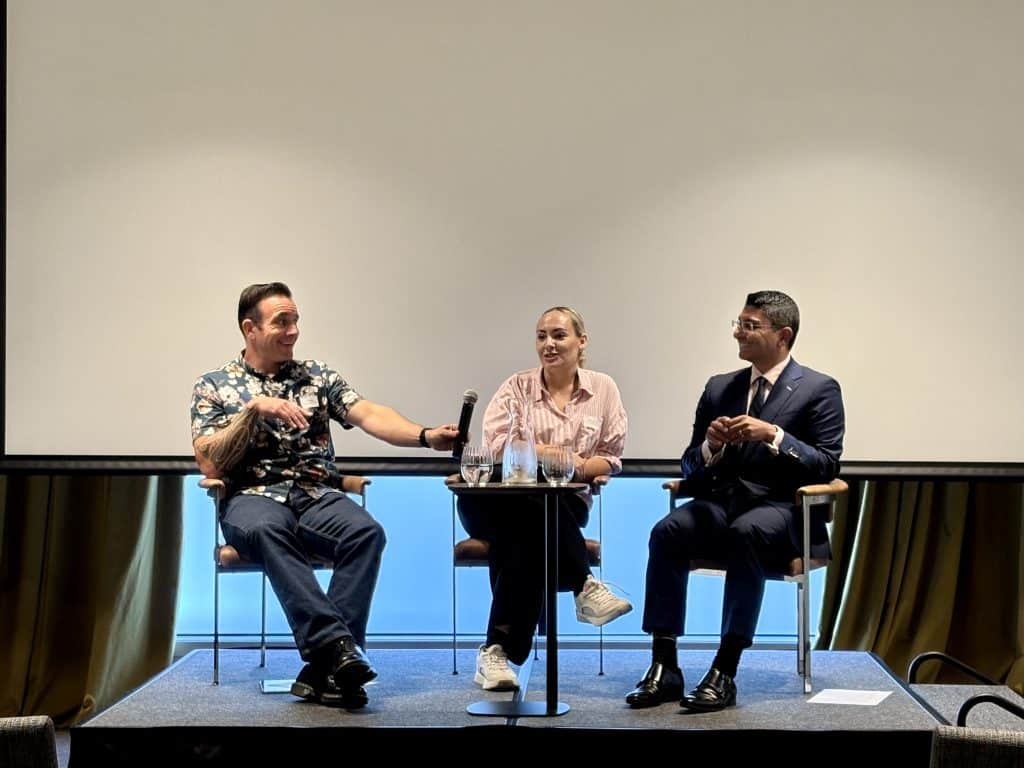If you’re a sustainability professional, or ESG leader (environmental, social, governance), you don’t need another headline telling you that it’s rough out there.
With environmental and social initiatives increasingly under threat and budgets continuing to shrink, it can feel like you’re shouting into the void. But this is exactly when resilience matters most.
So, how do you continue to make progress while maintaining your sanity?
Earlier this year, we brought together Paul Evans, Independent Director at Localised and Shamubeel Eaqub, Chief Economist at Simplicity alongside our very own CEO, Laura Gemmell for a much needed, no-filter conversation on how sustainability professionals can stay effective and resilient in our current economic times.
Find common ground with the people you work with.
You’d be forgiven for thinking we live in a binary world today.
Red vs blue.
Good vs bad.
Us vs them.
The carefully curated echo chambers we’re funnelled into (thanks, algorithms!) have fostered a tribe mentality where opposing viewpoints are demonised.
Sustainability professionals are often faced with the myth that we must choose between a strong economy or a thriving planet, even though it’s been proven that we can have both.
“If we want to move forward, we have to restore trust in each other,” said Shamubeel, who recently co-authored a report on social cohesion in New Zealand.
The report, commissioned by the Helen Clark Foundation, revealed that social cohesion in Aotearoa is alarmingly low. We lag behind our neighbours across the Tasman on every dimension, from political preference and work participation to income and ethnicity.
The irony is that most people want the same things: clean air and water, safe communities, a healthy future for our children, a roof over our heads. We just have a vastly different idea of how to get there. Shamubeel suggested that one way we can bridge the gap is to align your organisation’s sustainability goals with existing priorities of other teams.
“If we can bring different interest groups together, be it at a board level or HR or finance and show them that there are certain overlapping actions where we can all win, we’ll be more likely to see some compromise.”
This might look like shifting the narrative from the business isn’t doing enough to address this issue’ to ‘here’s how I can help our business solve this problem’. Rather than assigning blame, how can we present a better way forward to build trust and momentum?
Put your hand up for leadership roles
When asked how we can make sure ESG is a priority at a Board level, Paul Evans stated, “we need better Boards” and encouraged people in the audience to put themselves forward.
While Boards play a crucial role in helping businesses mitigate risk and ensure compliance, there’s a significant gap in their knowledge and confidence to effectively drive ambitious strategies. A 2024 survey by PwC found that only 13% of executives believe that their boards understand climate risks “Very Well” and 38% wanted sustainability expertise added to their boards in the next 12 months.
As regulations tighten and investor expectations rise, Boards that lack sustainability literacy may expose their organisations to long-term risk – both reputational and financial.
If we want stronger leadership on climate and social impact, we need more diverse minds in the room where decisions are made. People like you.
Whether it’s joining a Board, an advisory group, or a governance committee, put yourself forward and be the change you wish to see.
Surround yourself with the right people
It’s easy to get demoralised by the sheer scale of problems we face, or to feel isolated when things don’t go as planned. In fact, Insights on Aotearoa New Zealand Sustainability Professionals 2025 found that climate anxiety and emotional exhaustion are rising, particularly among younger professionals.
Anyone who’s worked in sustainability long enough knows it takes a certain level of optimism to keep showing up. It’s important to have a strong support network of people who truly understand what it’s like, whether it’s your colleagues or industry peers. People you can openly share your wins and losses with and who empathise with the emotional whiplash of feeling on top of the world, and then minutes later, completely disheartened.
The good news is there are plenty of opportunities to find your people. You could join a green team within your organisation or start one with your coworkers. There are also plenty of professional networks like Sustainable Business Network or Kiwis In Climate, volunteer with community groups such as EcoMatters or Repair Network Aotearoa or be part of a local support network like the Climate Action Support Network based in Auckland. Nothing like a good convo with the right people to remind you why you started.
Sometimes, getting the right type of support means shifting roles or finding a new environment where your vision is shared and appreciated.
“You are valuable,” advised Laura Gemmell, “Don’t waste your talent and effort where it’s not appreciated and you continually bang your head against a brick wall.”
Most importantly, remember that you are not alone. Across Aotearoa, there are countless people pushing for change, within organisations, in communities, and across industries. You might not always see them, but they’re moving the dial in ways big and small. And when we work together, we unlock even more potential for collective impact.
“Resilience isn’t built in a crisis,” said Paul Evans. “For ESG leaders, the real challenge is building cohesion before disruption hits. That means embedding sustainability not just in strategy but in culture, so it shows up when it matters most.”
How do you cultivate resilience in your workplace and keep the momentum going?
